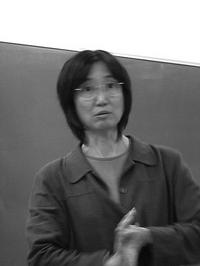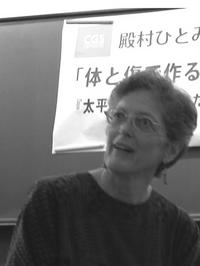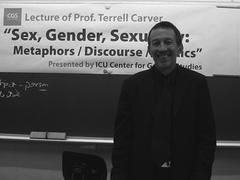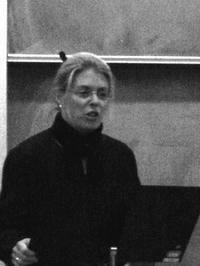
 On October 21, 2004, a joint symposium was held at ICU with Professors Anne Walthall and Hitomi Tonomura. It was conducted in a friendly, relaxed atmosphere, which enabled a lively exchange of ideas and opinions by both presenters and participants. The discussion between Professors Walthall and Tonomura unfolded to reveal an entirely different picture of Japanese history to that which I had known so far.
On October 21, 2004, a joint symposium was held at ICU with Professors Anne Walthall and Hitomi Tonomura. It was conducted in a friendly, relaxed atmosphere, which enabled a lively exchange of ideas and opinions by both presenters and participants. The discussion between Professors Walthall and Tonomura unfolded to reveal an entirely different picture of Japanese history to that which I had known so far.
05. Newsletter: July 2005 Archives
On Thursday, October 14th, 2004, I attended a screening of Trinh T. Minh-ha's latest work, Night Passage, at Tokyo University of Foreign Studies. The event also included a lecture and discussion session with Professor Ryūta Imafuku (Cultural Anthropology, Sapporo University) and Professor Narihiko Nishi (Comparative Literature, Ritsumeikan University). Through a variety of art forms - film, poetry, music, writing - Minh-ha has explored the problem of plural identities from postcolonial and feminist perspectives. She draws on her own personal experience, being born in Vietnam, and having studied in France and the U.S., and taught in Senegal. She now teaches film theory at UCLA, Berkeley. My reason for attending this event was because I am particularly interested in the boundaries between film - particularly fiction - and documentary, so I wanted to learn more about Minh-ha, a film artist who is not bound to one genre.
 In introducing himself, Professor Carver, from the University of Bristol in the United Kingdom, mentioned that he was influenced by Judith Butler's books, Gender Trouble and Undoing Gender. He was also largely influenced by R.W. Connell's book, Masculinities. During his talk, he promised to hit on the following three points:
In introducing himself, Professor Carver, from the University of Bristol in the United Kingdom, mentioned that he was influenced by Judith Butler's books, Gender Trouble and Undoing Gender. He was also largely influenced by R.W. Connell's book, Masculinities. During his talk, he promised to hit on the following three points:
 Are social scientists demonstrating their scientific ignorance by bringing a gender perspective into fields such as medicine and biology? Yet, perspectives from epistemology and scientific philosophy are crucial to a critical assessment of science and of objectivity.
Are social scientists demonstrating their scientific ignorance by bringing a gender perspective into fields such as medicine and biology? Yet, perspectives from epistemology and scientific philosophy are crucial to a critical assessment of science and of objectivity.